NURSING 3 - Psychosocial Development of Andrew: A Nursing Essay
VerifiedAdded on 2022/11/01
|8
|1607
|478
Essay
AI Summary
This nursing essay examines the psychosocial development of Andrew, a child whose development is causing concern for his mother. The essay explores Erikson's theory of psychosocial development, specifically focusing on the initiative versus guilt stage, and applies it to Andrew's case. It highlights key aspects of psychosocial development in children aged 2-5 years, such as communication, social interaction, and toilet training. The essay emphasizes the importance of parental and caregiver support in fostering healthy development, and also discusses factors influencing psychosocial development, including maturation, training, family relationships, and social environment. The essay concludes with a summary of the main points and references relevant literature.
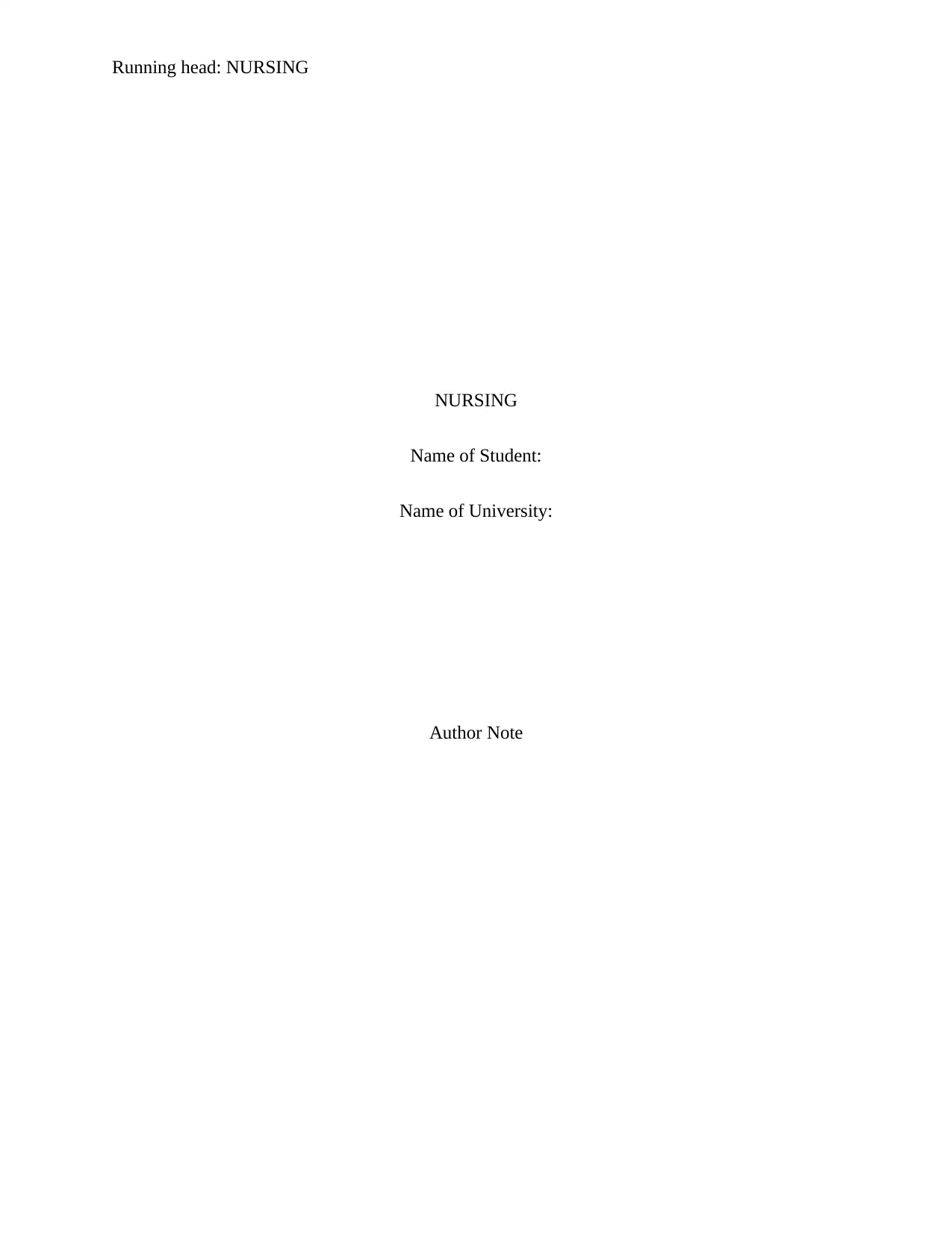
Running head: NURSING
NURSING
Name of Student:
Name of University:
Author Note
NURSING
Name of Student:
Name of University:
Author Note
Paraphrase This Document
Need a fresh take? Get an instant paraphrase of this document with our AI Paraphraser
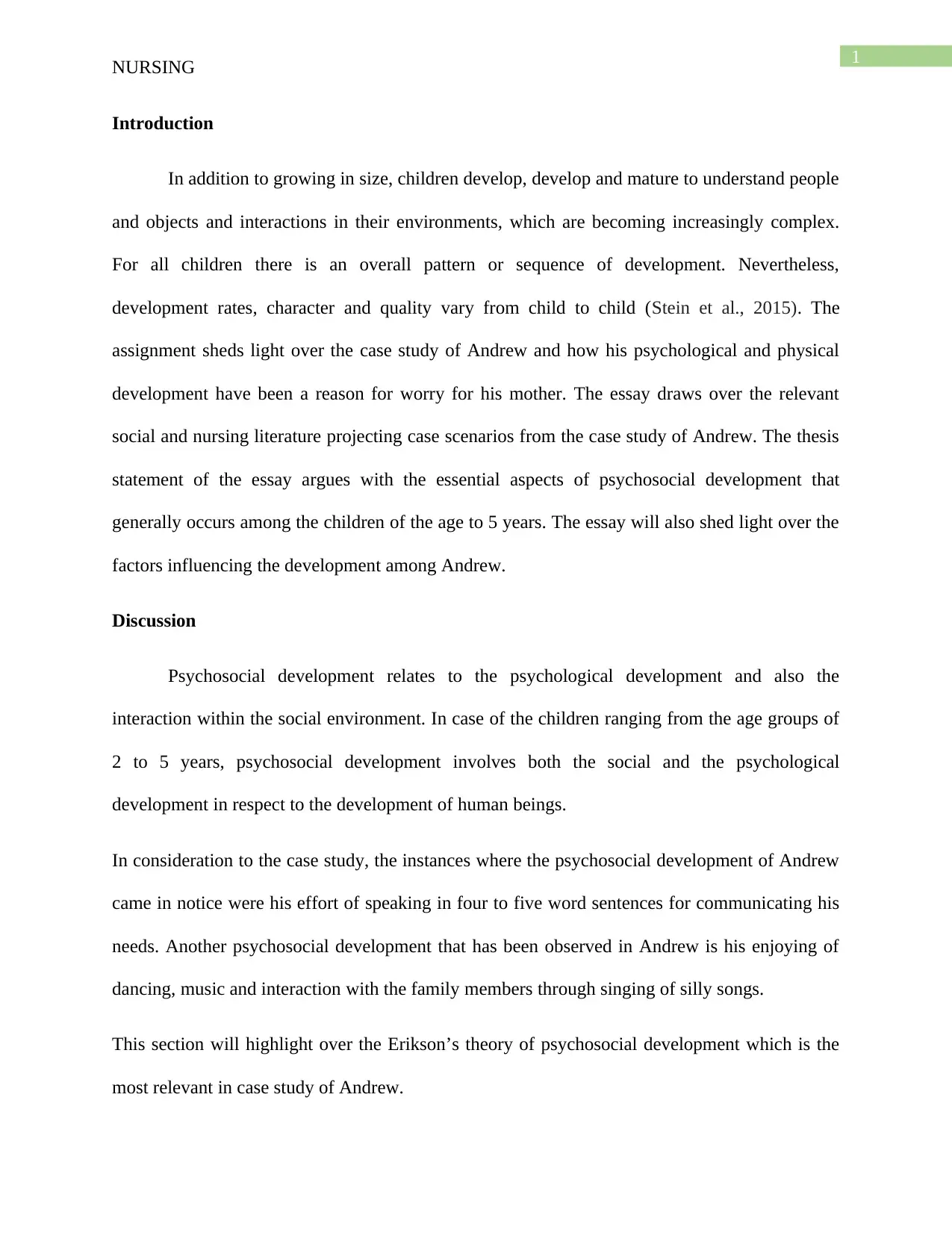
1
NURSING
Introduction
In addition to growing in size, children develop, develop and mature to understand people
and objects and interactions in their environments, which are becoming increasingly complex.
For all children there is an overall pattern or sequence of development. Nevertheless,
development rates, character and quality vary from child to child (Stein et al., 2015). The
assignment sheds light over the case study of Andrew and how his psychological and physical
development have been a reason for worry for his mother. The essay draws over the relevant
social and nursing literature projecting case scenarios from the case study of Andrew. The thesis
statement of the essay argues with the essential aspects of psychosocial development that
generally occurs among the children of the age to 5 years. The essay will also shed light over the
factors influencing the development among Andrew.
Discussion
Psychosocial development relates to the psychological development and also the
interaction within the social environment. In case of the children ranging from the age groups of
2 to 5 years, psychosocial development involves both the social and the psychological
development in respect to the development of human beings.
In consideration to the case study, the instances where the psychosocial development of Andrew
came in notice were his effort of speaking in four to five word sentences for communicating his
needs. Another psychosocial development that has been observed in Andrew is his enjoying of
dancing, music and interaction with the family members through singing of silly songs.
This section will highlight over the Erikson’s theory of psychosocial development which is the
most relevant in case study of Andrew.
NURSING
Introduction
In addition to growing in size, children develop, develop and mature to understand people
and objects and interactions in their environments, which are becoming increasingly complex.
For all children there is an overall pattern or sequence of development. Nevertheless,
development rates, character and quality vary from child to child (Stein et al., 2015). The
assignment sheds light over the case study of Andrew and how his psychological and physical
development have been a reason for worry for his mother. The essay draws over the relevant
social and nursing literature projecting case scenarios from the case study of Andrew. The thesis
statement of the essay argues with the essential aspects of psychosocial development that
generally occurs among the children of the age to 5 years. The essay will also shed light over the
factors influencing the development among Andrew.
Discussion
Psychosocial development relates to the psychological development and also the
interaction within the social environment. In case of the children ranging from the age groups of
2 to 5 years, psychosocial development involves both the social and the psychological
development in respect to the development of human beings.
In consideration to the case study, the instances where the psychosocial development of Andrew
came in notice were his effort of speaking in four to five word sentences for communicating his
needs. Another psychosocial development that has been observed in Andrew is his enjoying of
dancing, music and interaction with the family members through singing of silly songs.
This section will highlight over the Erikson’s theory of psychosocial development which is the
most relevant in case study of Andrew.
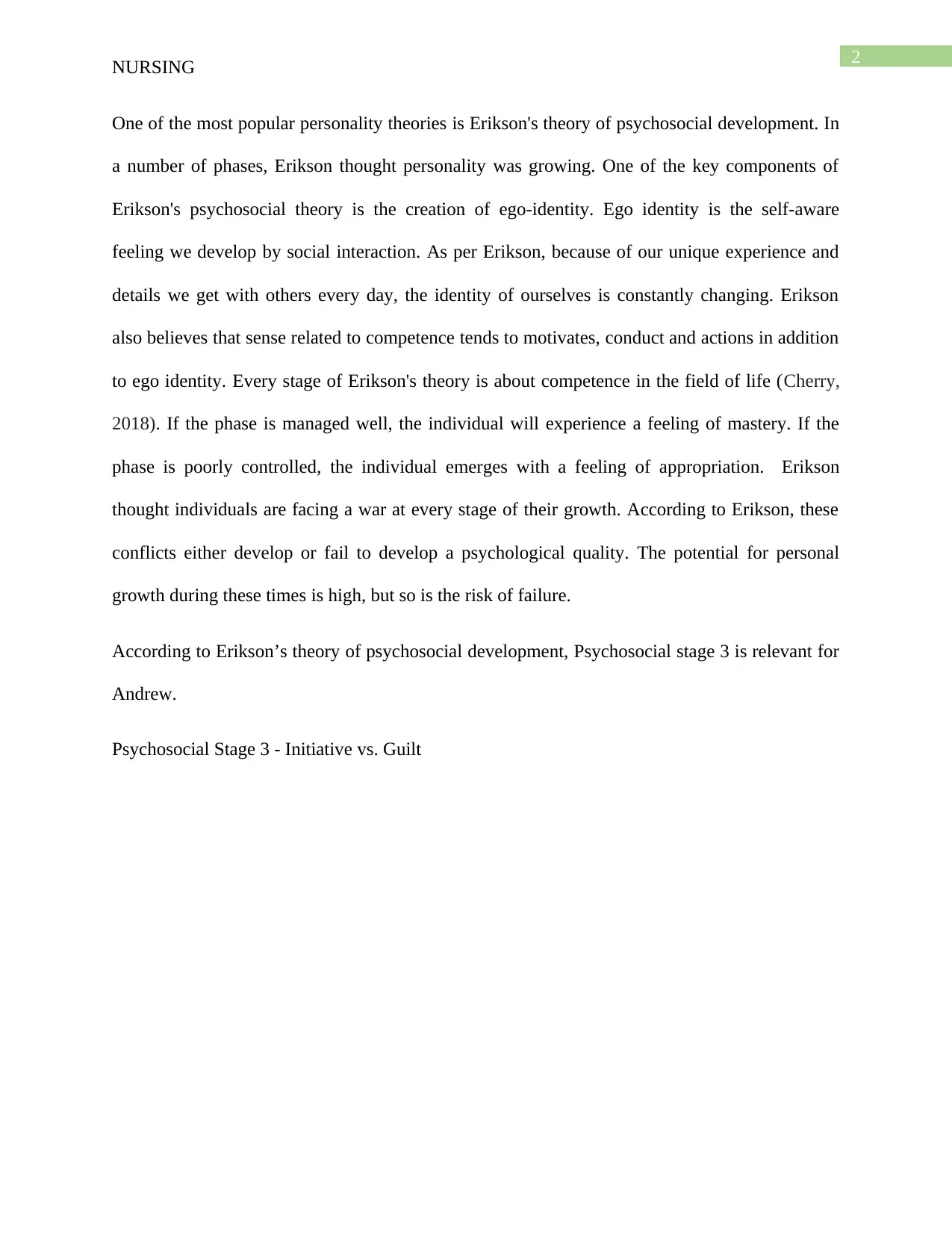
2
NURSING
One of the most popular personality theories is Erikson's theory of psychosocial development. In
a number of phases, Erikson thought personality was growing. One of the key components of
Erikson's psychosocial theory is the creation of ego-identity. Ego identity is the self-aware
feeling we develop by social interaction. As per Erikson, because of our unique experience and
details we get with others every day, the identity of ourselves is constantly changing. Erikson
also believes that sense related to competence tends to motivates, conduct and actions in addition
to ego identity. Every stage of Erikson's theory is about competence in the field of life (Cherry,
2018). If the phase is managed well, the individual will experience a feeling of mastery. If the
phase is poorly controlled, the individual emerges with a feeling of appropriation. Erikson
thought individuals are facing a war at every stage of their growth. According to Erikson, these
conflicts either develop or fail to develop a psychological quality. The potential for personal
growth during these times is high, but so is the risk of failure.
According to Erikson’s theory of psychosocial development, Psychosocial stage 3 is relevant for
Andrew.
Psychosocial Stage 3 - Initiative vs. Guilt
NURSING
One of the most popular personality theories is Erikson's theory of psychosocial development. In
a number of phases, Erikson thought personality was growing. One of the key components of
Erikson's psychosocial theory is the creation of ego-identity. Ego identity is the self-aware
feeling we develop by social interaction. As per Erikson, because of our unique experience and
details we get with others every day, the identity of ourselves is constantly changing. Erikson
also believes that sense related to competence tends to motivates, conduct and actions in addition
to ego identity. Every stage of Erikson's theory is about competence in the field of life (Cherry,
2018). If the phase is managed well, the individual will experience a feeling of mastery. If the
phase is poorly controlled, the individual emerges with a feeling of appropriation. Erikson
thought individuals are facing a war at every stage of their growth. According to Erikson, these
conflicts either develop or fail to develop a psychological quality. The potential for personal
growth during these times is high, but so is the risk of failure.
According to Erikson’s theory of psychosocial development, Psychosocial stage 3 is relevant for
Andrew.
Psychosocial Stage 3 - Initiative vs. Guilt
⊘ This is a preview!⊘
Do you want full access?
Subscribe today to unlock all pages.

Trusted by 1+ million students worldwide
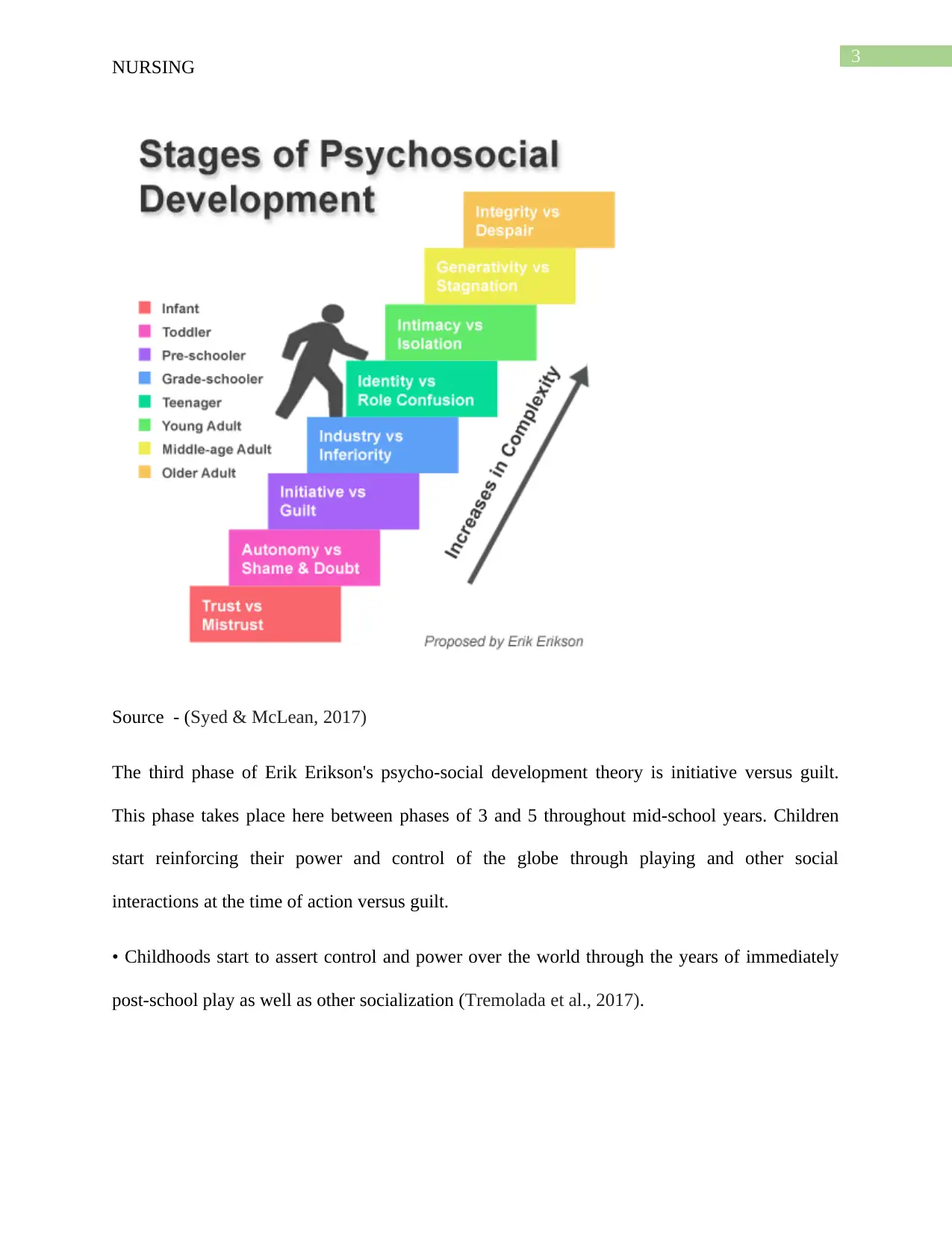
3
NURSING
Source - (Syed & McLean, 2017)
The third phase of Erik Erikson's psycho-social development theory is initiative versus guilt.
This phase takes place here between phases of 3 and 5 throughout mid-school years. Children
start reinforcing their power and control of the globe through playing and other social
interactions at the time of action versus guilt.
• Childhoods start to assert control and power over the world through the years of immediately
post-school play as well as other socialization (Tremolada et al., 2017).
NURSING
Source - (Syed & McLean, 2017)
The third phase of Erik Erikson's psycho-social development theory is initiative versus guilt.
This phase takes place here between phases of 3 and 5 throughout mid-school years. Children
start reinforcing their power and control of the globe through playing and other social
interactions at the time of action versus guilt.
• Childhoods start to assert control and power over the world through the years of immediately
post-school play as well as other socialization (Tremolada et al., 2017).
Paraphrase This Document
Need a fresh take? Get an instant paraphrase of this document with our AI Paraphraser
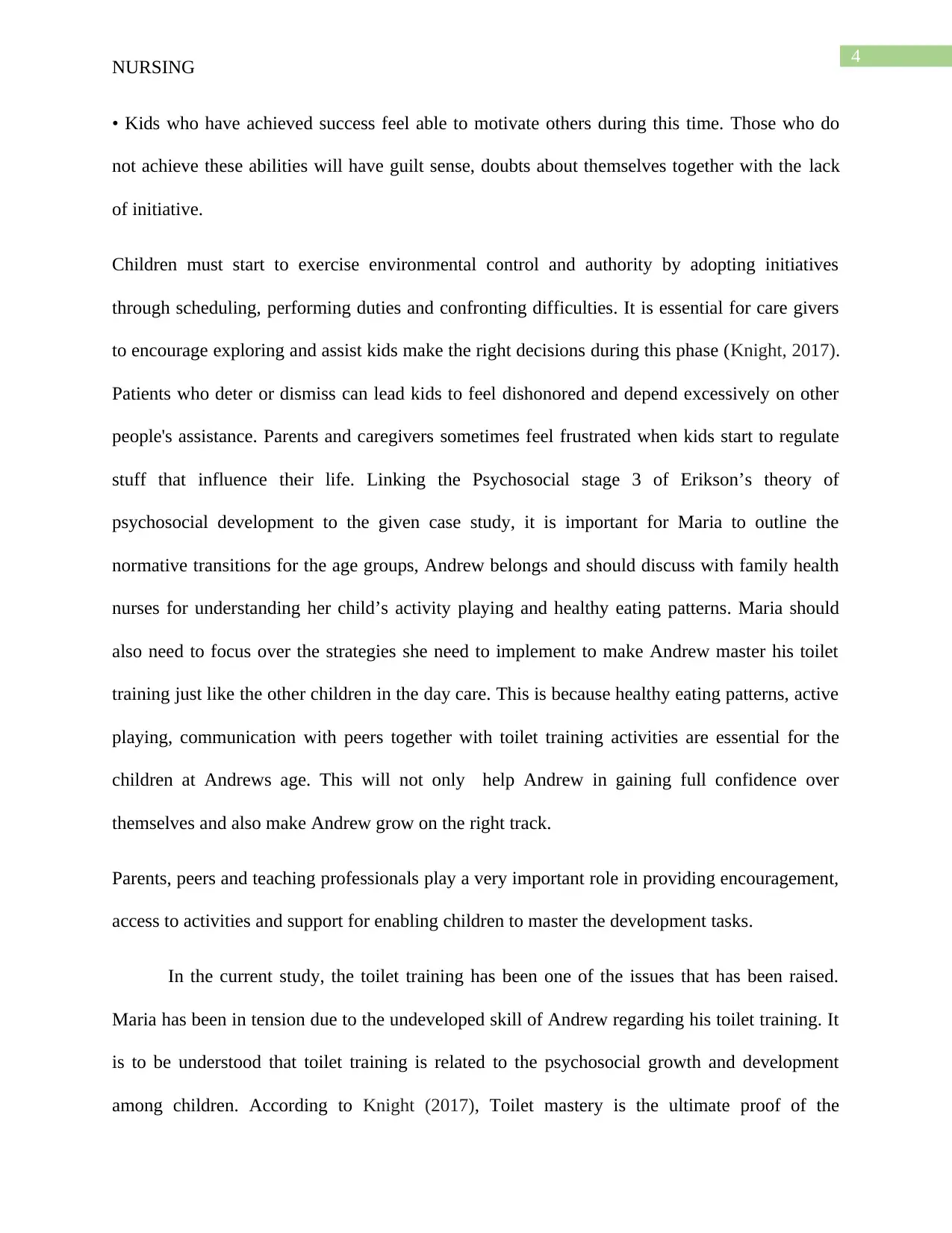
4
NURSING
• Kids who have achieved success feel able to motivate others during this time. Those who do
not achieve these abilities will have guilt sense, doubts about themselves together with the lack
of initiative.
Children must start to exercise environmental control and authority by adopting initiatives
through scheduling, performing duties and confronting difficulties. It is essential for care givers
to encourage exploring and assist kids make the right decisions during this phase (Knight, 2017).
Patients who deter or dismiss can lead kids to feel dishonored and depend excessively on other
people's assistance. Parents and caregivers sometimes feel frustrated when kids start to regulate
stuff that influence their life. Linking the Psychosocial stage 3 of Erikson’s theory of
psychosocial development to the given case study, it is important for Maria to outline the
normative transitions for the age groups, Andrew belongs and should discuss with family health
nurses for understanding her child’s activity playing and healthy eating patterns. Maria should
also need to focus over the strategies she need to implement to make Andrew master his toilet
training just like the other children in the day care. This is because healthy eating patterns, active
playing, communication with peers together with toilet training activities are essential for the
children at Andrews age. This will not only help Andrew in gaining full confidence over
themselves and also make Andrew grow on the right track.
Parents, peers and teaching professionals play a very important role in providing encouragement,
access to activities and support for enabling children to master the development tasks.
In the current study, the toilet training has been one of the issues that has been raised.
Maria has been in tension due to the undeveloped skill of Andrew regarding his toilet training. It
is to be understood that toilet training is related to the psychosocial growth and development
among children. According to Knight (2017), Toilet mastery is the ultimate proof of the
NURSING
• Kids who have achieved success feel able to motivate others during this time. Those who do
not achieve these abilities will have guilt sense, doubts about themselves together with the lack
of initiative.
Children must start to exercise environmental control and authority by adopting initiatives
through scheduling, performing duties and confronting difficulties. It is essential for care givers
to encourage exploring and assist kids make the right decisions during this phase (Knight, 2017).
Patients who deter or dismiss can lead kids to feel dishonored and depend excessively on other
people's assistance. Parents and caregivers sometimes feel frustrated when kids start to regulate
stuff that influence their life. Linking the Psychosocial stage 3 of Erikson’s theory of
psychosocial development to the given case study, it is important for Maria to outline the
normative transitions for the age groups, Andrew belongs and should discuss with family health
nurses for understanding her child’s activity playing and healthy eating patterns. Maria should
also need to focus over the strategies she need to implement to make Andrew master his toilet
training just like the other children in the day care. This is because healthy eating patterns, active
playing, communication with peers together with toilet training activities are essential for the
children at Andrews age. This will not only help Andrew in gaining full confidence over
themselves and also make Andrew grow on the right track.
Parents, peers and teaching professionals play a very important role in providing encouragement,
access to activities and support for enabling children to master the development tasks.
In the current study, the toilet training has been one of the issues that has been raised.
Maria has been in tension due to the undeveloped skill of Andrew regarding his toilet training. It
is to be understood that toilet training is related to the psychosocial growth and development
among children. According to Knight (2017), Toilet mastery is the ultimate proof of the
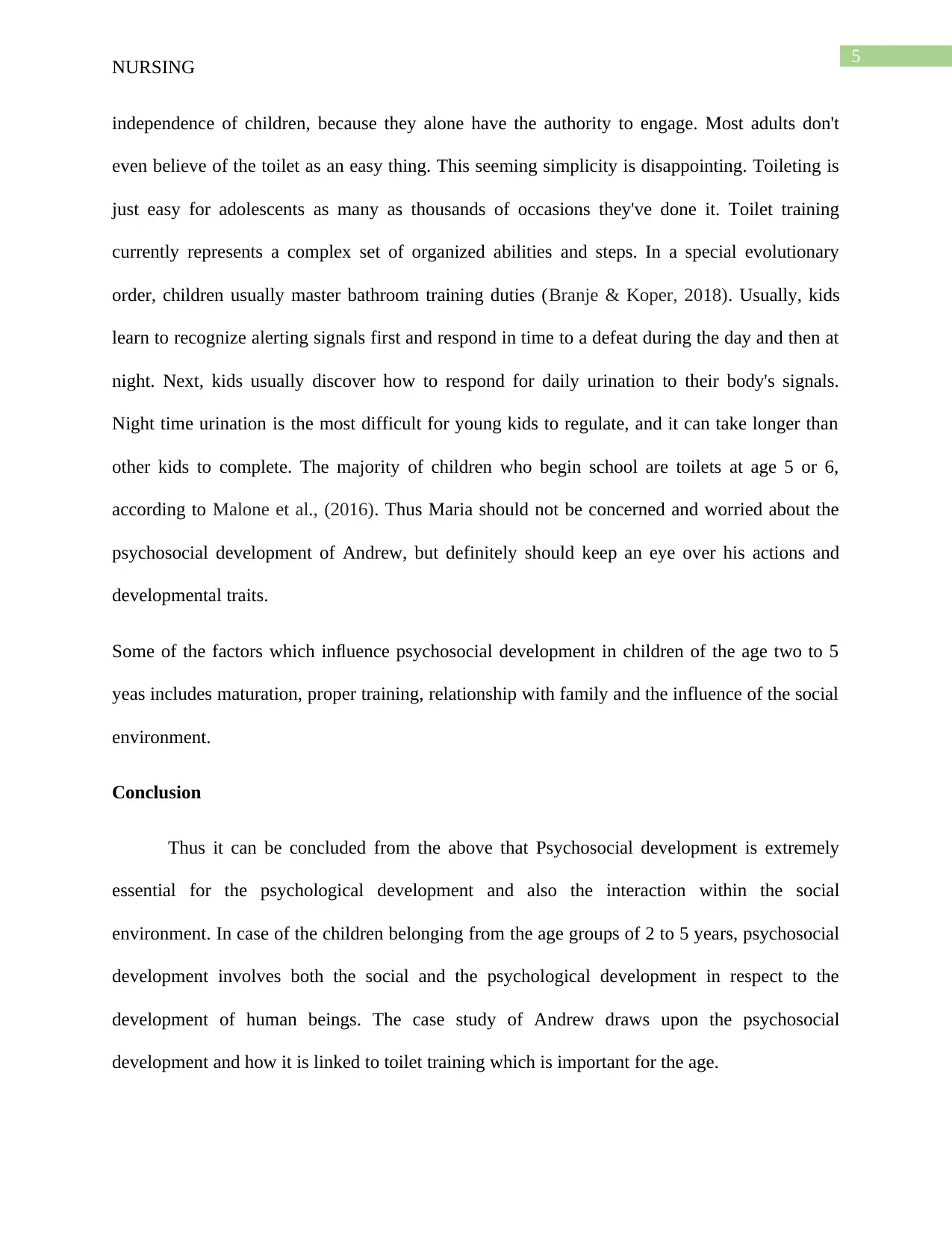
5
NURSING
independence of children, because they alone have the authority to engage. Most adults don't
even believe of the toilet as an easy thing. This seeming simplicity is disappointing. Toileting is
just easy for adolescents as many as thousands of occasions they've done it. Toilet training
currently represents a complex set of organized abilities and steps. In a special evolutionary
order, children usually master bathroom training duties (Branje & Koper, 2018). Usually, kids
learn to recognize alerting signals first and respond in time to a defeat during the day and then at
night. Next, kids usually discover how to respond for daily urination to their body's signals.
Night time urination is the most difficult for young kids to regulate, and it can take longer than
other kids to complete. The majority of children who begin school are toilets at age 5 or 6,
according to Malone et al., (2016). Thus Maria should not be concerned and worried about the
psychosocial development of Andrew, but definitely should keep an eye over his actions and
developmental traits.
Some of the factors which influence psychosocial development in children of the age two to 5
yeas includes maturation, proper training, relationship with family and the influence of the social
environment.
Conclusion
Thus it can be concluded from the above that Psychosocial development is extremely
essential for the psychological development and also the interaction within the social
environment. In case of the children belonging from the age groups of 2 to 5 years, psychosocial
development involves both the social and the psychological development in respect to the
development of human beings. The case study of Andrew draws upon the psychosocial
development and how it is linked to toilet training which is important for the age.
NURSING
independence of children, because they alone have the authority to engage. Most adults don't
even believe of the toilet as an easy thing. This seeming simplicity is disappointing. Toileting is
just easy for adolescents as many as thousands of occasions they've done it. Toilet training
currently represents a complex set of organized abilities and steps. In a special evolutionary
order, children usually master bathroom training duties (Branje & Koper, 2018). Usually, kids
learn to recognize alerting signals first and respond in time to a defeat during the day and then at
night. Next, kids usually discover how to respond for daily urination to their body's signals.
Night time urination is the most difficult for young kids to regulate, and it can take longer than
other kids to complete. The majority of children who begin school are toilets at age 5 or 6,
according to Malone et al., (2016). Thus Maria should not be concerned and worried about the
psychosocial development of Andrew, but definitely should keep an eye over his actions and
developmental traits.
Some of the factors which influence psychosocial development in children of the age two to 5
yeas includes maturation, proper training, relationship with family and the influence of the social
environment.
Conclusion
Thus it can be concluded from the above that Psychosocial development is extremely
essential for the psychological development and also the interaction within the social
environment. In case of the children belonging from the age groups of 2 to 5 years, psychosocial
development involves both the social and the psychological development in respect to the
development of human beings. The case study of Andrew draws upon the psychosocial
development and how it is linked to toilet training which is important for the age.
⊘ This is a preview!⊘
Do you want full access?
Subscribe today to unlock all pages.

Trusted by 1+ million students worldwide

6
NURSING
NURSING
Paraphrase This Document
Need a fresh take? Get an instant paraphrase of this document with our AI Paraphraser
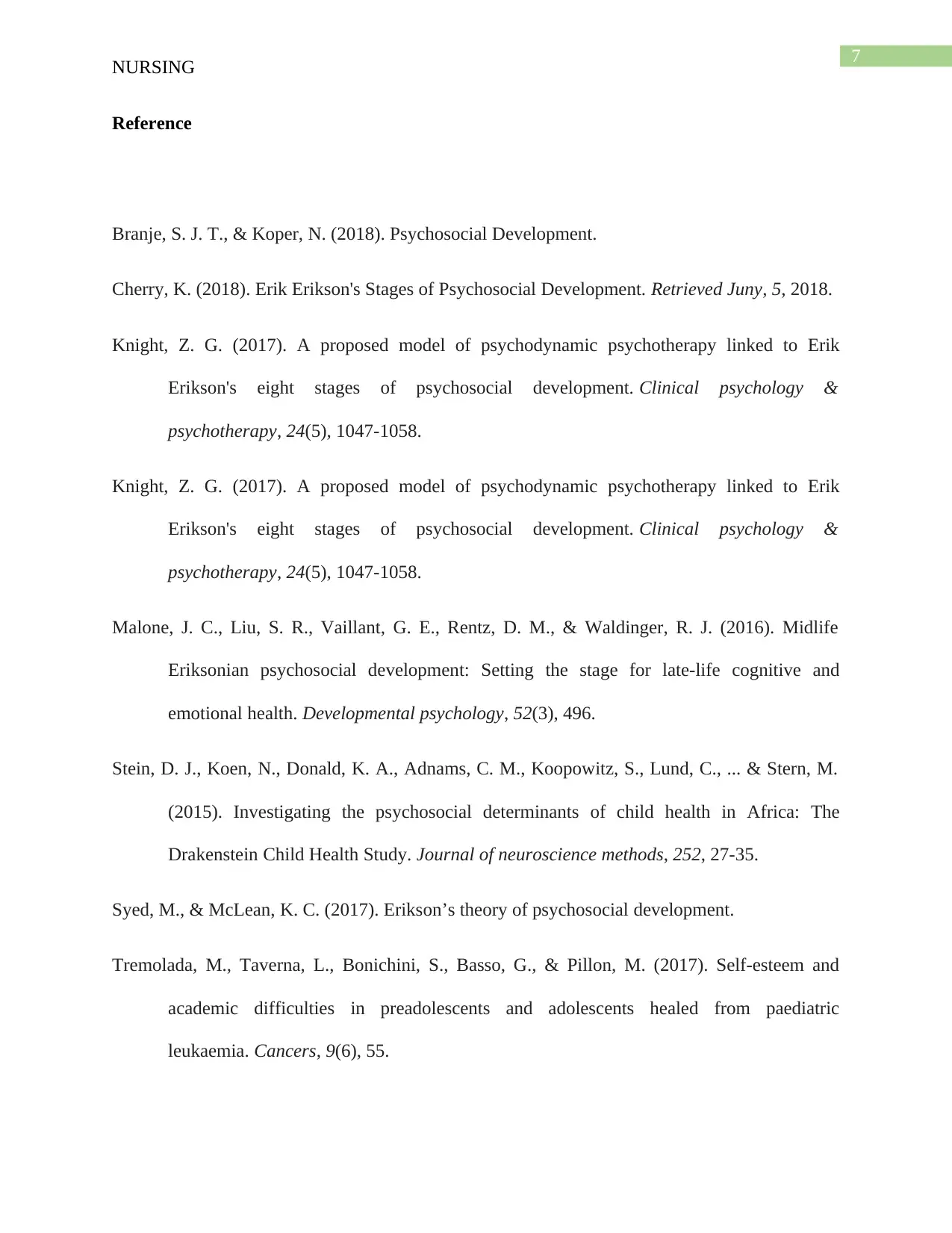
7
NURSING
Reference
Branje, S. J. T., & Koper, N. (2018). Psychosocial Development.
Cherry, K. (2018). Erik Erikson's Stages of Psychosocial Development. Retrieved Juny, 5, 2018.
Knight, Z. G. (2017). A proposed model of psychodynamic psychotherapy linked to Erik
Erikson's eight stages of psychosocial development. Clinical psychology &
psychotherapy, 24(5), 1047-1058.
Knight, Z. G. (2017). A proposed model of psychodynamic psychotherapy linked to Erik
Erikson's eight stages of psychosocial development. Clinical psychology &
psychotherapy, 24(5), 1047-1058.
Malone, J. C., Liu, S. R., Vaillant, G. E., Rentz, D. M., & Waldinger, R. J. (2016). Midlife
Eriksonian psychosocial development: Setting the stage for late-life cognitive and
emotional health. Developmental psychology, 52(3), 496.
Stein, D. J., Koen, N., Donald, K. A., Adnams, C. M., Koopowitz, S., Lund, C., ... & Stern, M.
(2015). Investigating the psychosocial determinants of child health in Africa: The
Drakenstein Child Health Study. Journal of neuroscience methods, 252, 27-35.
Syed, M., & McLean, K. C. (2017). Erikson’s theory of psychosocial development.
Tremolada, M., Taverna, L., Bonichini, S., Basso, G., & Pillon, M. (2017). Self-esteem and
academic difficulties in preadolescents and adolescents healed from paediatric
leukaemia. Cancers, 9(6), 55.
NURSING
Reference
Branje, S. J. T., & Koper, N. (2018). Psychosocial Development.
Cherry, K. (2018). Erik Erikson's Stages of Psychosocial Development. Retrieved Juny, 5, 2018.
Knight, Z. G. (2017). A proposed model of psychodynamic psychotherapy linked to Erik
Erikson's eight stages of psychosocial development. Clinical psychology &
psychotherapy, 24(5), 1047-1058.
Knight, Z. G. (2017). A proposed model of psychodynamic psychotherapy linked to Erik
Erikson's eight stages of psychosocial development. Clinical psychology &
psychotherapy, 24(5), 1047-1058.
Malone, J. C., Liu, S. R., Vaillant, G. E., Rentz, D. M., & Waldinger, R. J. (2016). Midlife
Eriksonian psychosocial development: Setting the stage for late-life cognitive and
emotional health. Developmental psychology, 52(3), 496.
Stein, D. J., Koen, N., Donald, K. A., Adnams, C. M., Koopowitz, S., Lund, C., ... & Stern, M.
(2015). Investigating the psychosocial determinants of child health in Africa: The
Drakenstein Child Health Study. Journal of neuroscience methods, 252, 27-35.
Syed, M., & McLean, K. C. (2017). Erikson’s theory of psychosocial development.
Tremolada, M., Taverna, L., Bonichini, S., Basso, G., & Pillon, M. (2017). Self-esteem and
academic difficulties in preadolescents and adolescents healed from paediatric
leukaemia. Cancers, 9(6), 55.
1 out of 8
Related Documents
Your All-in-One AI-Powered Toolkit for Academic Success.
+13062052269
info@desklib.com
Available 24*7 on WhatsApp / Email
![[object Object]](/_next/static/media/star-bottom.7253800d.svg)
Unlock your academic potential
Copyright © 2020–2026 A2Z Services. All Rights Reserved. Developed and managed by ZUCOL.





